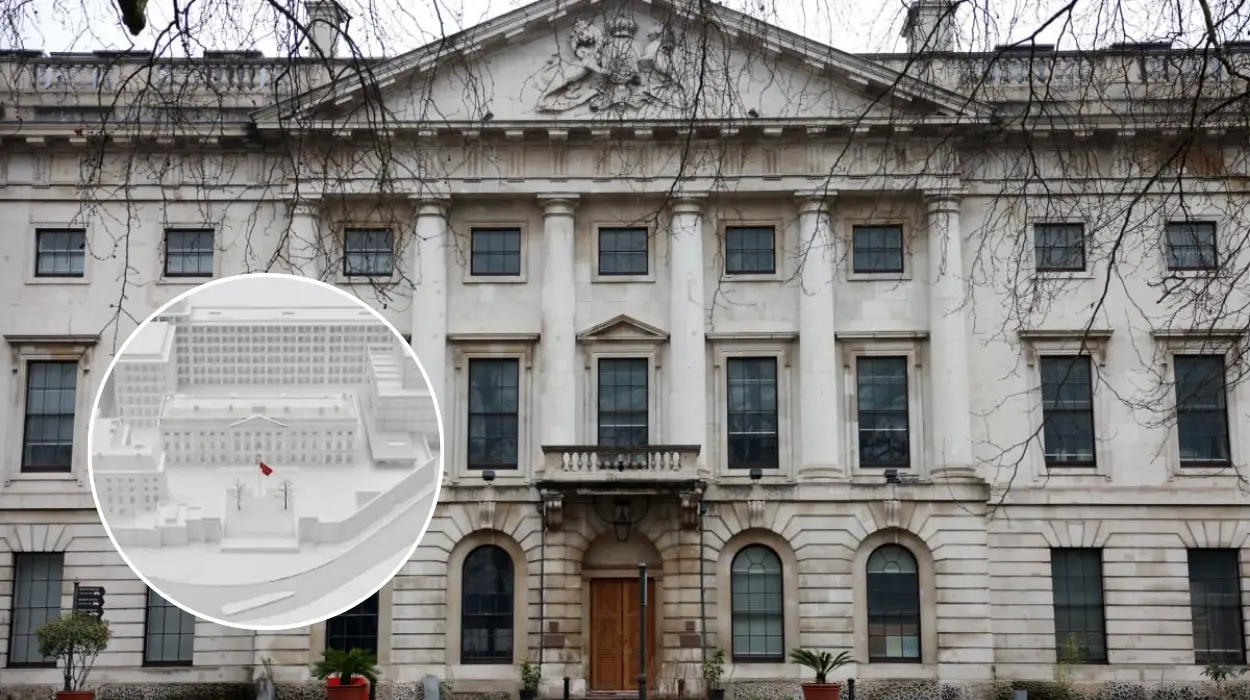Key Points
- China has threatened Britain with “consequences” if the UK government blocks its plans to build a mega-embassy at Royal Mint Court, East London.
- The proposed embassy would be the largest in Europe, covering 600,000 square feet near the Tower of London.
- The UK government has repeatedly delayed approving the planning application, citing national security concerns.
- The embassy site is close to sensitive financial infrastructure, including fiber optic cables that serve the City of London and Canary Wharf.
- Tower Hamlets Council rejected the initial Chinese embassy plans in 2022 over security fears.
- The application was resubmitted in 2024 and then taken over by central government for a decision.
- Large parts of the building plans were redacted by China for “security reasons,” increasing suspicion and controversy.
- The British government has emphasised that national security is paramount.
- The embassy plans have sparked protests and scrutiny from politicians and intelligence agencies.
- The UK Foreign and Home Offices, alongside local government and police, are involved in reviewing responses.
- The Chinese embassy claims it is following diplomatic protocols and proposes the embassy in “promoting understanding and friendship.”
- Conservative MPs and anti-China activists cite espionage concerns, with the US government reportedly warning the UK to reject the plans.
- Labour’s Keir Starmer and Housing Secretary Steve Reed have delayed the decision, with the latest deadline pushed to 10 December 2025.
What is the controversy over China’s mega embassy planned for East London?
As reported by Sky News and the BBC, China intends to build a giant embassy complex at Royal Mint Court near the Tower of London, a site it purchased for £255 million in 2018. The embassy would be the biggest in Europe, spanning 20,000 square metres (approximately 600,000 square feet), housing office spaces, a basement, accommodation for 200 staff, and even a private tunnel to another building on the site.
- Key Points
- What is the controversy over China’s mega embassy planned for East London?
- How has the UK government responded to the Chinese embassy plans?
- What is China’s stance on the embassy plans?
- What are the political and security implications of the super embassy?
- What is the current status and next steps regarding the embassy decision?
The controversy stems primarily from national security concerns. Tower Hamlets Council initially rejected the plans in 2022 due to fears about espionage, amplified by the embassy’s proximity to critical communication infrastructure. The site lies above fiber optic cables that link financial institutions in the City of London and Canary Wharf, raising fears that it could be exploited by China for intelligence gathering on European and British financial communications.
China’s refusal to fully disclose internal plans, citing “security reasons,” has further deepened suspicions. Large portions of the building plans were redacted, which anti-China activists and British officials suggest could conceal facilities for detaining dissidents or other undisclosed functions. The Chinese government maintains this redaction is customary for diplomatic buildings and follows international protocol.
Protests against the embassy have been held, reflecting public unease about potential Chinese surveillance and influence in London.
How has the UK government responded to the Chinese embassy plans?
The Labour government, led by Sir Keir Starmer, has delayed making a final decision on the embassy application multiple times. The responsibility for the decision was brought from Tower Hamlets Council to central government in 2024, shortly after Labour came to power, through a “call-in” process by then-Housing Secretary Angela Rayner.
Housing Secretary Steve Reed, Rayner’s successor, extended the deadline for a decision to 10 December 2025 due to the “detailed nature” of responses from various stakeholders, including the Foreign Office and Home Office. This ongoing review highlights the complexity and sensitivity of balancing diplomatic relations with security concerns.
Pressed by journalists, a government spokesman asserted that “national security is paramount,” making clear that no economic or political benefit would override security imperatives. The government insists that the decision will be made strictly on the merits of the case and that “we would never compromise national security”.
What is China’s stance on the embassy plans?
China has expressed “serious concern” over the delays, warning Britain of “consequences” if the embassy is blocked, as reported by The Telegraph and Yahoo News. Beijing officials argue that the embassy plans are in line with “customary diplomatic practices” and that the embassy project is designed to foster “understanding and friendship” between China and the UK.
In response to criticism over the redacted plans, China has stated that it is standard practice for diplomatic premises not to disclose full internal layouts, citing the example of the US-UK embassy at Nine Elms, which also withheld internal details.
What are the political and security implications of the super embassy?
Conservative politicians and security experts remain highly vocal about the risks involved. Sir Iain Duncan Smith, a Conservative MP known for his critical stance on China, warned that the embassy’s location near vital infrastructure could facilitate espionage activities targeting not just the UK but Europe.
The Shadow Home Secretary, Chris Philp, echoed these concerns, supporting the US government’s position against approving the embassy. According to The Sunday Times, diplomatic warnings from Washington have cautioned the UK about the potential intelligence threat posed by the project.
The British government’s intelligence and security agencies, along with the Metropolitan Police and local authorities, are involved in scrutinising the application. These agencies have yet to provide a conclusive security clearance for the project, which contributes to the ongoing delays.
What is the current status and next steps regarding the embassy decision?
As of October 2025, the decision by Secretary of State for Housing Steve Reed has been postponed to 10 December 2025. The government remains under pressure to balance national security concerns against diplomatic and economic relations with China.
Labour leader Keir Starmer has faced calls from Chinese officials to personally intervene and approve the plans, but the UK government maintains its position that security concerns will drive any final decision.
The planning application process has also involved consultations with local residents and special interest groups, reflecting the contentious nature of the development within the Tower Hamlets community.
China’s mega embassy plan in East London remains a significant diplomatic and security issue, symbolising the complex nature of UK-China relations in 2025. The government’s cautious approach reflects deep concerns about espionage and infrastructure security, while Beijing’s warnings signal the potential geopolitical repercussions of a rejection. The coming weeks will be crucial in determining whether the proposed embassy becomes a reality and how the UK navigates its strategic ties with China.



